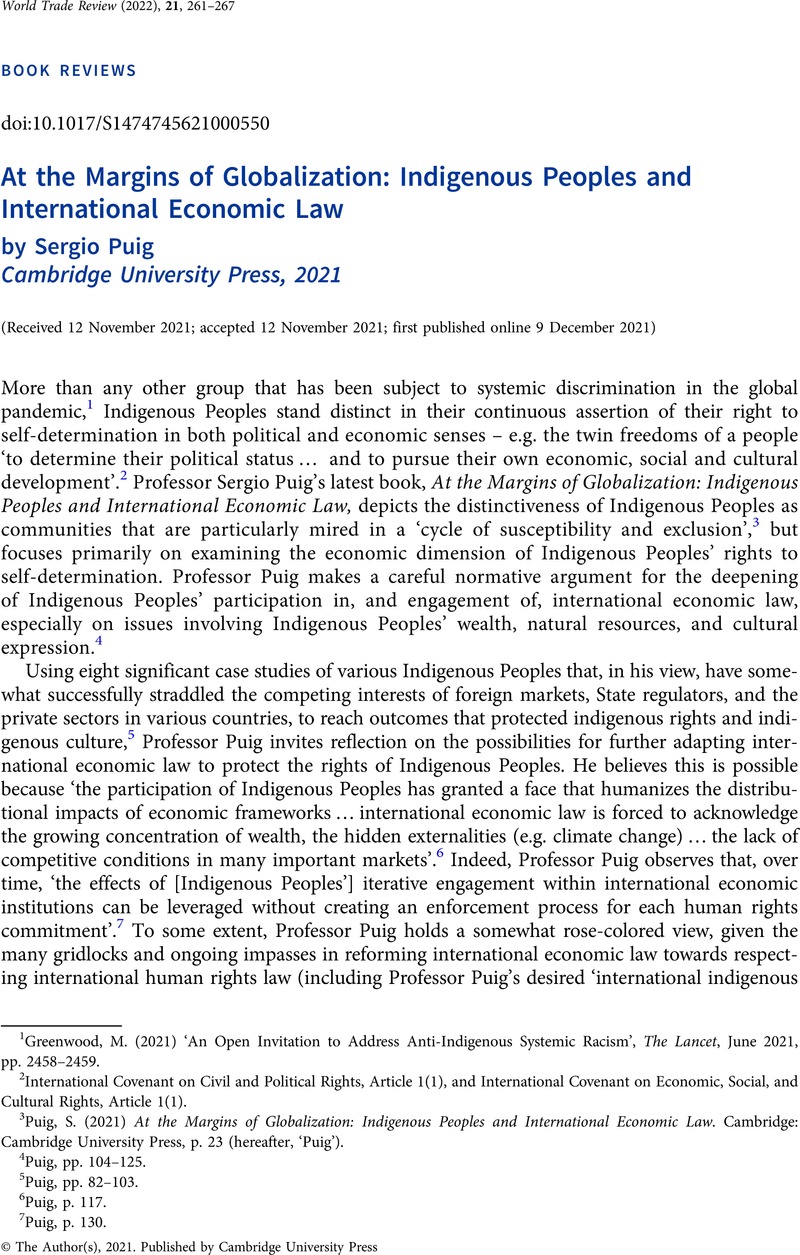No CrossRef data available.
Article contents
At the Margins of Globalization: Indigenous Peoples and International Economic Law by Sergio Puig Cambridge University Press, 2021
Published online by Cambridge University Press: 09 December 2021
Abstract

- Type
- Book Review
- Information
- Copyright
- Copyright © The Author(s), 2021. Published by Cambridge University Press
References
1 Greenwood, M. (2021) ‘An Open Invitation to Address Anti-Indigenous Systemic Racism’, The Lancet, June 2021, pp. 2458–2459.
2 International Covenant on Civil and Political Rights, Article 1(1), and International Covenant on Economic, Social, and Cultural Rights, Article 1(1).
3 Puig, S. (2021) At the Margins of Globalization: Indigenous Peoples and International Economic Law. Cambridge: Cambridge University Press, p. 23 (hereafter, ‘Puig’).
4 Puig, pp. 104–125.
5 Puig, pp. 82–103.
6 Puig, p. 117.
7 Puig, p. 130.
8 Puig, S. (2019) ‘International Indigenous Economic Law’, UC Davis Law Review 52(3), 1243–1316.
9 See Desierto, D.A. (2015) Public Policy in International Economic Law: The ICESCR in Trade, Finance, and Investment. Oxford: Oxford University Press.
10 See United Nations Human Rights Council (2018) ‘Report of the Special Rapporteur on the Rights of Indigenous Peoples’, A/HRC/39/17, 10 August 2018, https://undocs.org/A/HRC/39/17 (accessed 21 October 2021).
11 Shrinkhal, R. (2021) ‘Indigenous Sovereignty’ and Right to Self-Determination in International Law: A Critical Appraisal’, AlterNative: An International Journal of Indigenous Peoples 17(1), 71–82; United Nations General Assembly (2019) ‘Rights of Indigenous Peoples’, A/74/179, 17 July 2019, https://undocs.org/A/74/149 (accessed 21 October 2021).
12 Bellier, I. and J. Hays (eds.) (2021) Scales of Governance and Indigenous Peoples’ Rights. Abingdon-on-Thames, Oxford: Routledge.
13 New Zealand Ministry of Foreign Affairs and Trade, ‘Preserving Our Right to Regulate’, www.mfat.govt.nz/jp/trade/nz-trade-policy/preserving-our-right-to-regulate/, 21 October 2021.
14 Puig, pp. 58–62.
15 See, for example, Tzouvala, N. (2020) Capitalism as Civilization: A History of International Law. Cambridge: Cambridge University Press; Garcia, F.J. (2017) ‘Globalization, Inequality, and International Economic Law’, Religions 8(5); Venzke, I. (2021) ‘The Law of the Global Economy and the Spectre of Inequality’, London Review of International Law 9(1), 111–134.
16 See Lenzerini, F. (ed.) (2008) Reparations for Indigenous Peoples: International and Comparative Perspectives. Oxford: Oxford University Press.
17 Puig, p. 43.
18 See Kim, H. (2016) Regime Accommodation in International Law: Human Rights in International Economic Law and Policy. Leiden, The Netherlands: Brill.
19 Puig, pp. 141–147.
20 Puig, pp. 126–140.
21 United Nations Declaration on the Rights of Indigenous Peoples, Article 3 (‘Indigenous peoples have the right to self-determination. By virtue of that right they freely determine their political status and freely pursue their economic, social and cultural development.’).
22 1986 Declaration on the Right to Development, Article 1(1).
23 Uluru Statement from the Heart, www.referendumcouncil.org.au/sites/default/files/2017-05/Uluru_Statement_From_The_Heart_0.PDF (accessed 21 October 2021).




